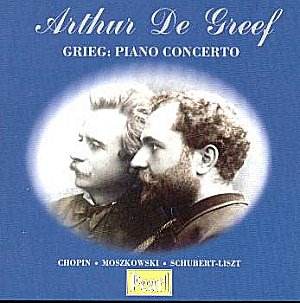Louvain-born Arthur de Greef spent about two
years as a Liszt pupil. His distinguished performing career was
matched by an equal commitment to teaching and in that capacity
he taught for many years at the Brussels Conservatoire. This particular
release is notable for the Grieg Concerto because the composer
was a friend and known admirer of de Greef and had been since
their first meeting in 1889 when the pianist performed under Grieg's
baton for the first time. It's true that Grieg extended the same
compliments to Percy Grainger and to Severin Eisenberger, both
of whom, incidentally left recordings of the Grieg Concerto, but
it remains true to say that de Greef was the longest lasting association
of the three pianists and that it was he who made the first complete
recording of the work (beating Friedman by a year and eclipsing
the previous, cut versions by de Greef himself and Wilhelm Backhaus).
His concerto repertoire seems to have been, deliberately, rather
circumscribed but well tailored to show his gifts - both Liszt
concertos, Saint-Saëns' G minor, Franck's Variations symphonique
and the Grieg. De Greef was, in all respects, an intensely musical,
non-sensationalist, eloquent and impressive musician and whilst
not being averse to some of the interventionist tactics of his
contemporaries (retouching of the score) remained sympathetically
self-effacing.
His Grieg Concerto is incisive, intelligent and unflamboyant.
The opening movement whilst broadly sober is still sufficiently
vigorous, tonally expressive and with some delightfully witty
pointing of the line. It's true that the accompaniment from the
Royal Albert Hall Orchestra is, well, flabby and there are a number
of miss hits along the way, as well as some modifications to and
departures from the score by de Greef (generally to do with increased
sonority). The end of the Allegro moderato however is notable
for its heavily determined and powerfully sense of tension. De
Greef can't do much in response to the groaning portamenti of
the string section of the orchestra - if you object to the Hallé's
portamenti of about this period (say roughly 1924-1932) you'll
find the Manchester band cleanliness itself in comparison. But
his phrasing is affectionately engaged, nothing too excessive,
and it's probably not his fault, and more that of the recording
level, that he sounds simply too loud. Lest he be thought too
gentlemanly, de Greef interpolates a device of his own at the
beginning of the last movement. If Hofmann can introduce rolled
chords into the slow movement of the Beethoven Concerto in G then
de Greef can thrown in an outrageous glissando here - otherwise
this is well nuanced and steadily impressive playing - athletic
but not supercharged, not showing off either (and did I detect
acoustic era brass doublings here and elsewhere?). His trills
are not the most leonine - but he compensates by really keeping
the pedal down at the end. This is, all in all, a most important
and thought-provoking performance.
Elsewhere we have some more evidence of his stature. His rubati
in the Chopin B flat minor sonata are certainly a little idiosyncratic,
but this is personable and personalised playing. It's certainly
sober considered in the light of his more heroically inclined
pianistic contemporaries but that's not necessarily a bad thing.
There are uncomfortable moments in the Scherzo, and concerns about
the rhythm but he improves later on. The funeral march is gravely
noble without a hint of the fractured or frenzied about it but
the Presto has a few more moments of digital uncertainty. This
can I think best be demonstrated by the unusually high number
of takes required (as high as take twelve for one side - I think
it has to be said that his technique had considerably slackened
since his youth, if, indeed, it had ever been that good). I liked
the E flat Waltz, finger slips notwithstanding, and the A flat
Waltz is genuinely charming and colourful. The Waltz in G flat
is well characterised whilst his Schubert-Liszt is strong and
tonally varied, those Lisztian roulades subsumed not outsize.
His rubato (not something one often mentions in relation to him
but one should) is deliciously apposite in Moszkowski's Serenata
- a joyous performance - and the same composer's Waltz in E is
delightfully sprung, with nice accents, well judged diminuendi,
tight rhythm along with a judicious amount of elegantly humorous
swagger.
Transfers sound quite splendid and the notes are by Donald Manildi.
De Greef is probably little more than a name now - if that - so
it's good news that these recordings are in the catalogue and
especially so in relation to Grieg. There's always a place for
imaginative refinement.
Jonathan Woolf

![]() Royal Albert Hall Orchestra/Landon
Ronald, in the Grieg Concerto
Royal Albert Hall Orchestra/Landon
Ronald, in the Grieg Concerto![]() PEARL GEM 0080 [76.36]
PEARL GEM 0080 [76.36]